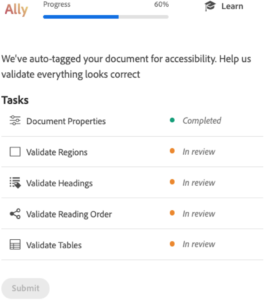Improving PDF Accessibility Tools for Content Creators
Ensuring that all users can access the documents they need for education, science, commerce, e-government, and recreation
This development project is funded by Inclusive Information and Communications Technology RERC (90REGE0008) from the National Institute on Disability, Independent Living, and Rehabilitation Research (NIDILRR), Administration for Community Living (ACL), Department of Health and Human Services (HHS). Learn more about the work of the Inclusive ICT RERC.
Project Team: Jonathan Lazar ; J. Bern Jordan; Debashish Pradhan, Tripti Rajput, Aravind Jembu Rajkumar, Sparsh Paliwal (Students)

This project has led to a tool called Ally, created in collaboration with Adobe Research.
The image above is a display in Ally where a task list and accessibility meter assist authors in making PDF documents accessible and show remediators where they are in the process.
Potential impact of this project on the lives of people with disabilities
Trillions of online documents are available in Portable Document Format (PDF), but only a very small fraction of these are accessible to people who use assistive technologies like screen readers, including those who are blind or have low vision. When PDF documents are inaccessible for people with disabilities, it creates barriers in education, science, commerce, e-government, and recreation. Documents in PDF format are considered harder to make accessible than documents in other formats, because the tools available to assist content creators are complicated and difficult to use.
This project will help make the following outcome possible:
- New software tools to help content creators review and fix their PDF documents to make them accessible to those with disabilities.
We are doing this work in collaboration with Adobe Research.
Definitions
- PDF, or Portable Document Format, is a digital format for files that looks like a printed document with text or text and graphics. A PDF file can be viewed, printed, or sent electronically.
- An accessible document is one that is easily readable by a reader who is blind, has low vision, or has a print disability and uses a screen reader. A screen reader is software that takes text and image content and either reads it aloud or converts it into braille. Document accessibility by a screen reader requires that the content is formatted in ways that it can be understood by the software (e.g., tables designed so that they can be read aloud, images that include alt text describing their content, etc.).
- Remediation is the process of removing the barriers to a document being accessible. A document is fully remediated when it meets the standards under PDF/UA.
- PDF/UA, or PDF/Universal Accessibility, is the international standard that describes the requirements for a PDF to be accessible. It was first approved and published by the International Organization for Standardization (ISO) in 2012.
PUBLICATIONS
- Pradhan, D., Rajput, T., Jembu Rajkumar, A., Lazar, J., Jain, R., Morariu, V. I., & Manjunatha, V. (2022). Development and evaluation of a tool for assisting content creators in making PDF files more accessible. ACM Transactions on Accessible Computing, 15, 1 (Article 3). DOI: https://doi.org/10.1145/3507661
- Read the full paper (pdf)
- View the presentation from ACM ASSETS 2022, TACCESS Paper.
- Wentz, B., Lazar, J., Jaeger, P. T., & Gorham, U. (2021). A socio-legal framework for improving the accessibility of research articles for people with disabilities. Journal of Business & Technology Law, 16, 2 (pp. 223-257, Article No. 3). Baltimore, MD: University of Maryland Carey School of Law. PMCID: PMC9201698
- Jembu Rajkumar, A., Jordan, JB, and Lazar, J. (2020). Improving PDF accessibility tools for content developers: Looking towards the future. In P. Langdon, J. Lazar, A. Heylighen, and H. Dong (Eds.), Inclusive Design: Looking towards the Future (pp. 173-181). London: Springer-Verlag.
- Jembu Rajkumar, A., Lazar, J., Jordan, JB, Hutter, H., and Darvishy, A. (2020). PDF accessibility of research papers: What tools are needed for assessment and remediation? Proceedings of the 53rd Annual Hawaii International Conference on System Sciences (pp. 4185-4194). Honolulu, HI: University of Hawaii. DOI:10.24251/HICSS.2020.512
PRESENTATIONS
Development and Evaluation of a Tool for Assisting Content Creators in Making PDF Files More Accessible [ACM TACCESS paper presented at ASSETS ’22]

